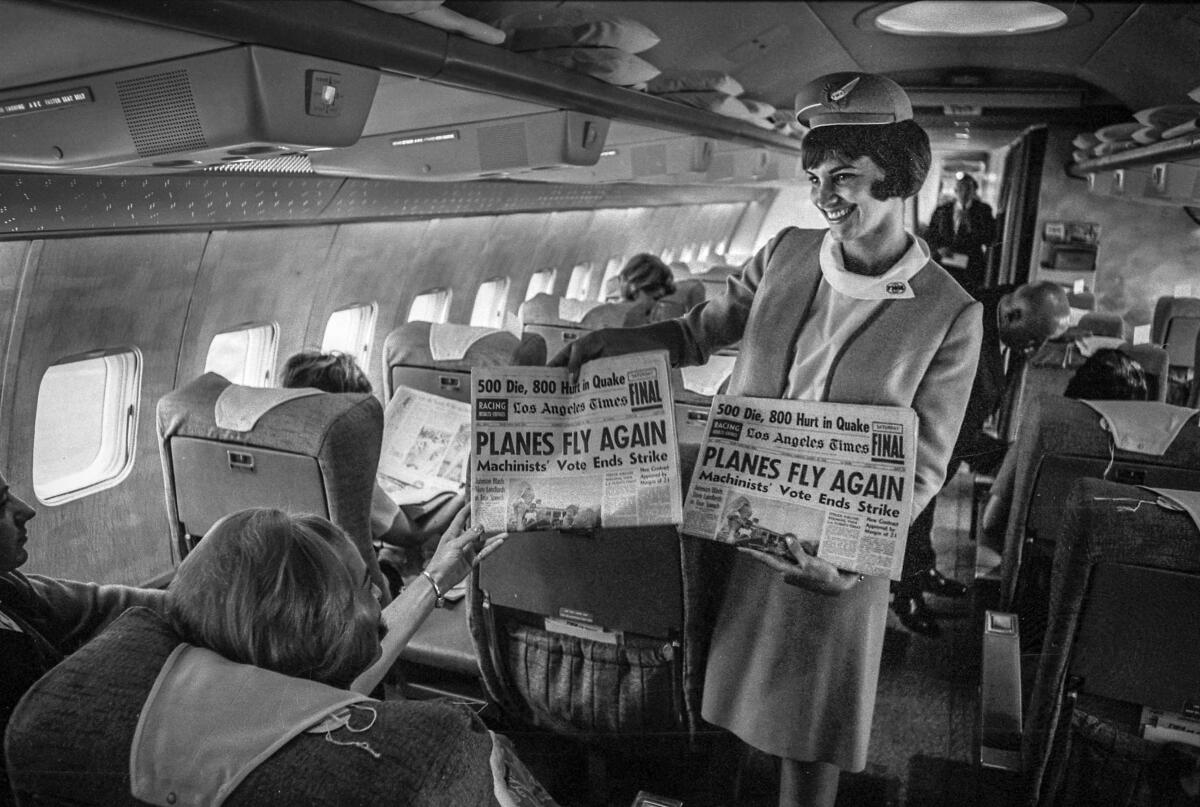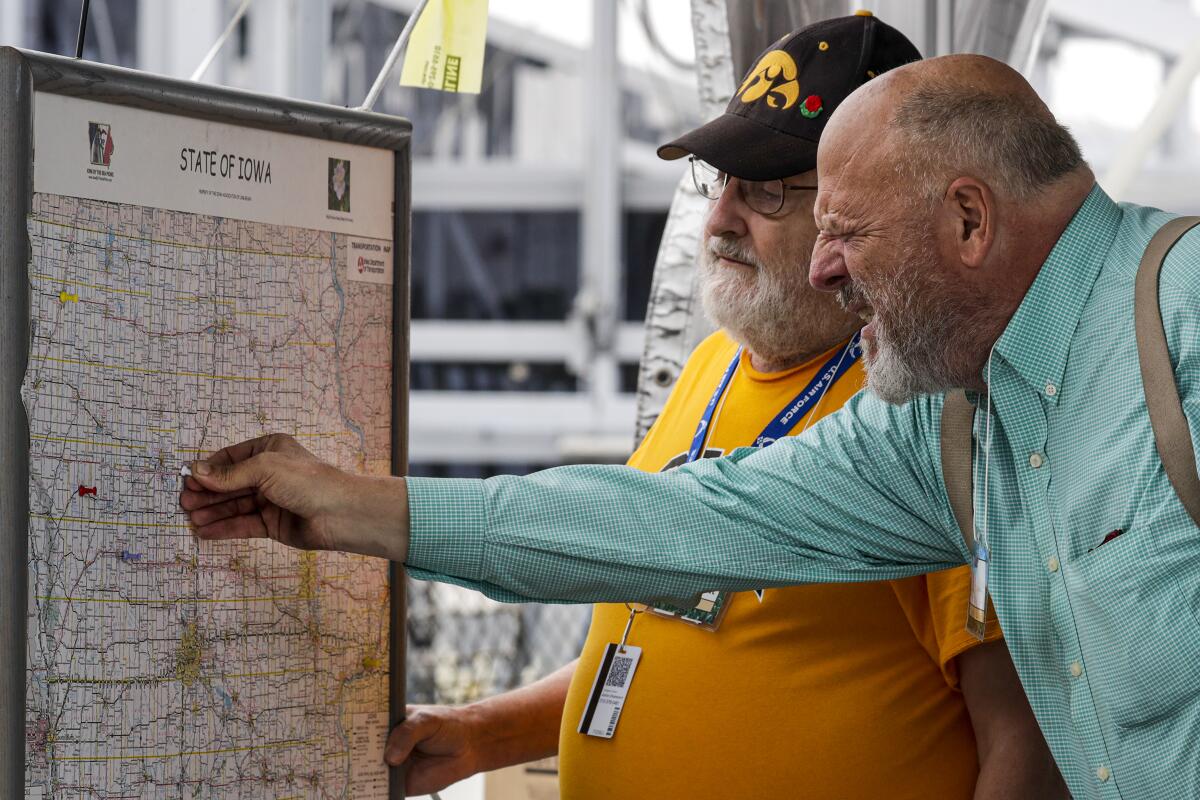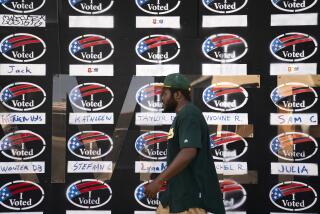Newsletter: Today: What two rallies tell us about the 2020 race
As Sens. Elizabeth Warren and Bernie Sanders compete to claim the position of the Democratic primary’s progressive front-runner, their rallies are instructive.
TOP STORIES
What Two Rallies Tell Us About the 2020 Race
As Sens. Elizabeth Warren and Bernie Sanders campaign in New Hampshire, the mantle of the Democratic primary’s left flank is at stake. But for all their ideological similarities, their rallies are lessons in the rivals’ differences — Sanders’ rhetoric hortatory and broad, Warren’s deeply personal. New Hampshire will be a key battleground, in part because both senators come from neighboring states. The two have been companionable, even as Warren steadily gains on Sanders in the polls. For some Sanders supporters who think the party skewed the 2016 race against him, Warren’s mainstream appeal is a sore point. But the broader fear among the left? That the pair will split the progressive vote.
More Politics
— Much of the current process for voting in Los Angeles County — ballots, polling locations, vote tallying and more — will change for the primary election in March. Here’s what you need to know to be ready.
Planned Outages Could Prevent Wildfires. What About the Elderly?
Before the power went out in Cecilia Santillano’s Simi Valley neighborhood last year, she had to decide: Ignore the monthly bills and buy a generator? Or hope the batteries on her husband’s ventilators would outlast the next outage? Such outages could become longer and more frequent as utilities expand their use of intentional electricity shutoffs to prevent power lines from sparking wildfires — and officials fear hundreds of thousands of disabled and elderly Californians could face dire situations, as electronic medical devices go dark and air conditioners turn off. They also know there are wrenching trade-offs.
In Paradise, Football Offers a Way to Heal
The Paradise High football team is leaning on camaraderie to rebuild their lives, nine months after the most destructive wildfire in state history turned their town into scorched metal and dust. With their training camp, the Bobcats are embarking on an autumn that is as much about healing as winning, and in which they’re aiming for a rebirth not only of football but of community. The players have told harrowing tales of their escapes from the blaze, and of the pain and uncertainty. And now, with the Aug. 23 season opener approaching, they are bracing for a difficult fight.
Kabul Attack Shows a Deal Won’t End the Violence
The Afghan capital’s deadliest attack this year — a wedding bombing that killed more than 60 people — has deepened questions about the Trump administration’s plan to withdraw U.S. troops by striking a peace deal with the Taliban even as other extremists keep killing civilians. That’s because it was the local affiliate of Islamic State that claimed responsibility Sunday for the blast in western Kabul. Taliban leaders, who have kept launching violent attacks of their own in recent months, say they are prepared to make a deal, but they hold no sway over Islamic State militants.
Your support helps us deliver the news that matters most. Subscribe to the Los Angeles Times.
Sign up to get Today’s Headlines delivered to your inbox. »
OUR MUST-READS FROM THE WEEKEND
— As politicians debate reparations, many descendants of enslaved black Americans want just as badly for the country to grasp and acknowledge an ongoing wrong.
— Latinos whose roots in America go back centuries are wrestling with their place in society, and some feel a painful kind of history is repeating itself. A few of them told us their stories.
— Our four-part series follows the residents of a homeless encampment as they move into apartments, and struggle to stay there.
— In an essay accompanying the series, journalist Thomas Curwen describes what he learned about homelessness.
FROM THE ARCHIVES
A major airline worker strike that had grounded most U.S. commercial air traffic ended on this day in 1966.
After the International Assn. of Machinists went on strike against five airlines on July 8, about 35,000 workers from various unions stayed off the job, and about 150,000 daily passengers scrambled for other transportation. Two settlement attempts by President Johnson’s White House staff failed.
Finally, after 43 days, the IMA ratified a settlement on Aug. 19, 1966, winning a 6% pay increase, and the airlines — TWA, United, Northwest, National and Eastern — resumed operations.

CALIFORNIA
— Police are searching for the gunman who shot and killed a middle school teacher as she sat in her truck with her 5-year-old son and boyfriend at a San Bernardino park.
— Pioneering Korean American journalist K. Connie Kang has died at 76. She was a meticulous and sensitive observer who covered the city’s Asian communities for the L.A. Times with deep understanding, colleagues said.
— A $100,000 bribe to the UCLA soccer coach got a Canadian teen a letter of acceptance and a scholarship, according to court documents. But the teen didn’t even play soccer.
— Two childhood friends — one an astrophysics student, the other about to become a father — were fatally shot last week on the South L.A. street where they grew up.
— A 7-year-old girl bouncing on a sofa in an upstairs Koreatown apartment fell through an open window to a concrete path below. She was in grave condition Sunday.
HOLLYWOOD AND THE ARTS
— Two major themes of KCON, the four-day K-pop convention at the Staples Center: diversity of fans and the revival of the girl group.
— “Good Boys” beat box-office estimates and had the best original comedy opening of the year.
NATION-WORLD
— Drug shortages. Food shortages. Maybe even water shortages. Secret British government documents have warned of serious disruptions nationwide if there’s a no-deal Brexit, the Sunday Times reported.
— Hong Kong protesters defied police restrictions and pouring rain to march across the city on Sunday.
— In the escalating tanker wars between the West and Iran, Washington’s pressure campaign is testing Europe’s patience.
— Yes, President Trump is eyeing Greenland, top economic advisor Larry Kudlow confirmed.
BUSINESS
— The millennia-old sport of falconry has found a lucrative new life: fending off nuisance birds.
— Our love of beef is rendering leather worthless, and our love of fast fashion isn’t helping.
— The latest casualty of Trump’s trade war with China? California wine.
SPORTS
— To the Dodgers, Sunday in Atlanta was just a dress rehearsal for the playoffs, so the Braves rallied past them.
— Between a lightning strike, a fire and some help from the police, Phil Mickelson had an interesting Sunday at the BMW Championship.
— Griffin Canning‘s third time through the lineup was the charm for the Angels on Sunday.
OPINION
— Trump’s plan to move Bureau of Land Management jobs west is a pretext to gut the agency, the editorial board writes.
— A drug called buprenorphine saved me from heroin addiction, David Poses writes in an op-ed. It could save millions more, if we let it.
WHAT OUR EDITORS ARE READING
— Emergency room patients call it “the follow-up appointment,” only it takes place in court. In a rural corner of Missouri where both patients and hospitals are going broke, a grim cycle has taken hold: The hospital that helps sustain its rural community sues locals for unpaid medical bills, and bankrupts them. (Washington Post)
— The former supervisor of a national forest in Arizona says her boss forced her a decade ago to stop questioning the legality of a proposed mine that a federal judge just blocked over similar concerns. (Arizona Daily Star)
ONLY IN L.A.
Long Beach’s Iowa Picnic used to draw tens of thousands of visitors every year, testament to an Iowan migration chain that got the city nicknamed “Iowa by the Sea.” But for decades, it’s struggled to attract crowds, as Iowan transplants died, moved or became fully assimilated Californians, and these days, a small clutch of longtimers and newcomers are willing it into existence — sharing Iowa memories, guessing how many corn kernels are in jars and singing the “Iowa Corn Song.”

If you like this newsletter, please share it with friends. Comments or ideas? Email us at headlines@latimes.com.
More to Read
Start your day right
Sign up for Essential California for news, features and recommendations from the L.A. Times and beyond in your inbox six days a week.
You may occasionally receive promotional content from the Los Angeles Times.






